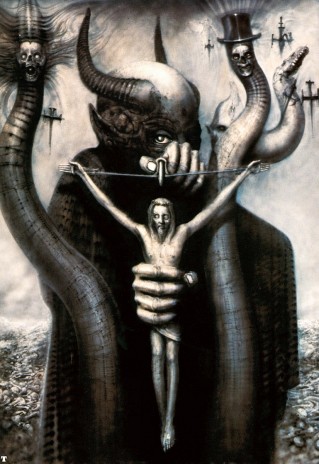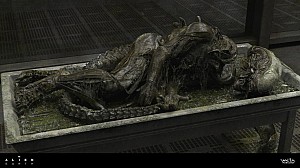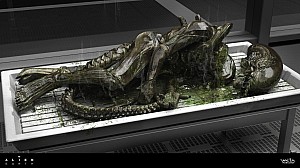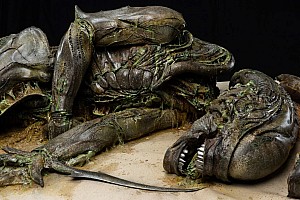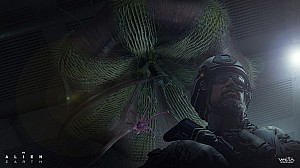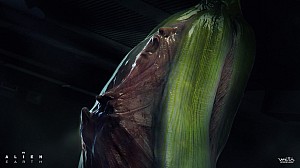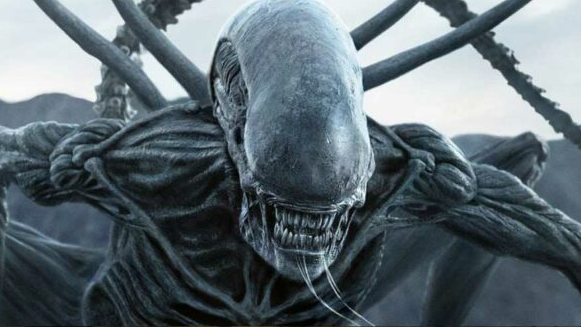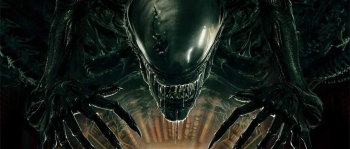found this good read
Prometheus Forum Topic
Buz Cheva
MemberOvomorphJun 22, 2012829 Views5 RepliesFound this on a website, would like to know peoples thoughts on it. Apologies if its been read before.
Prometheus Unbound: What The Movie Was Actually About
This blogpost contains many and frequent spoilers for Prometheus, so if you're planning on seeing it, I recommend you don't spoil yourself.
Prometheus contains such a huge amount of mythic resonance that it effectively obscures a more conventional plot. I'd like to draw your attention to the use of motifs and callbacks in the film that not only enrich it, but offer possible hints as to what was going on in otherwise confusing scenes.
Let's begin with the eponymous titan himself, Prometheus. He was a wise and benevolent entity who created mankind in the first place, forming the first humans from clay. The Gods were more or less okay with that, until Prometheus gave them fire. This was a big no-no, as fire was supposed to be the exclusive property of the Gods. As punishment, Prometheus was chained to a rock and condemned to have his liver ripped out and eaten every day by an eagle. (His liver magically grew back, in case you were wondering.)
Fix that image in your mind, please: the giver of life, with his abdomen torn open. We'll be coming back to it many times in the course of this article.
The ethos of the titan Prometheus is one of willing and necessary sacrifice for life's sake. That's a pattern we see replicated throughout the ancient world. J G Frazer wrote his lengthy anthropological study, The Golden Bough, around the idea of the Dying God - a lifegiver who voluntarily dies for the sake of the people. It was incumbent upon the King to die at the right and proper time, because that was what heaven demanded, and fertility would not ensue if he did not do his royal duty of dying.
Now, consider the opening sequence of Prometheus. We fly over a spectacular vista, which may or may not be primordial Earth. According to Ridley Scott, it doesn't matter. A lone Engineer at the top of a waterfall goes through a strange ritual, drinking from a cup of black goo that causes his body to disintegrate into the building blocks of life. We see the fragments of his body falling into the river, twirling and spiralling into DNA helices.
Ridley Scott has this to say about the scene: 'That could be a planet anywhere. All he’s doing is acting as a gardener in space. And the plant life, in fact, is the disintegration of himself. If you parallel that idea with other sacrificial elements in history – which are clearly illustrated with the Mayans and the Incas – he would live for one year as a prince, and at the end of that year, he would be taken and donated to the gods in hopes of improving what might happen next year, be it with crops or weather, etcetera.'
Can we find a God in human history who creates plant life through his own death, and who is associated with a river? It's not difficult to find several, but the most obvious candidate is Osiris, the epitome of all the Frazerian 'Dying Gods'.
And we wouldn't be amiss in seeing the first of the movie's many Christian allegories in this scene, either. The Engineer removes his cloak before the ceremony, and hesitates before drinking the cupful of genetic solvent; he may well have been thinking 'If it be Thy will, let this cup pass from me.'
So, we know something about the Engineers, a founding principle laid down in the very first scene: acceptance of death, up to and including self-sacrifice, is right and proper in the creation of life. Prometheus, Osiris, John Barleycorn, and of course the Jesus of Christianity are all supposed to embody this same principle. It is held up as one of the most enduring human concepts of what it means to be 'good'.
Seen in this light, the perplexing obscurity of the rest of the film yields to an examination of the interwoven themes of sacrifice, creation, and preservation of life. We also discover, through hints, exactly what the nature of the clash between the Engineers and humanity entailed.
The crew of the Prometheus discover an ancient chamber, presided over by a brooding solemn face, in which urns of the same black substance are kept. A mural on the wall presents an image which, if you did as I asked earlier on, you will recognise instantly: the lifegiver with his abdomen torn open. Go and look at it here to refresh your memory. Note the serenity on the Engineer's face here.
And there's another mural there, one which shows a familiar xenomorph-like figure. This is the Destroyer who mirrors the Creator, I think - the avatar of supremely selfish life, devouring and destroying others purely to preserve itself. As Ash puts it: 'a survivor, unclouded by conscience, remorse or delusions of morality.'
Through Shaw and Holloway's investigations, we learn that the Engineers not only created human life, they supervised our development. (How else are we to explain the numerous images of Engineers in primitive art, complete with star diagram showing us the way to find them?) We have to assume, then, that for a good few hundred thousand years, they were pretty happy with us. They could have destroyed us at any time, but instead, they effectively invited us over; the big pointy finger seems to be saying 'Hey, guys, when you're grown up enough to develop space travel, come see us.' Until something changed, something which not only messed up our relationship with them but caused their installation on LV-223 to be almost entirely wiped out.
From the Engineers' perspective, so long as humans retained that notion of self-sacrifice as central, we weren't entirely beyond redemption. But we went and screwed it all up, and the film hints at when, if not why: the Engineers at the base died two thousand years ago. That suggests that the event that turned them against us and led to the huge piles of dead Engineers lying about was one and the same event. We did something very, very bad, and somehow the consequences of that dreadful act accompanied the Engineers back to LV-223 and massacred them.
If you have uneasy suspicions about what 'a bad thing approximately 2,000 years ago' might be, then let me reassure you that you are right. An astonishing excerpt from the Movies.com interview with Ridley Scott:
Movies.com: We had heard it was scripted that the Engineers were targeting our planet for destruction because we had crucified one of their representatives, and that Jesus Christ might have been an alien. Was that ever considered?
Ridley Scott: We definitely did, and then we thought it was a little too on the nose. But if you look at it as an “our children are misbehaving down there” scenario, there are moments where it looks like we’ve gone out of control, running around with armor and skirts, which of course would be the Roman Empire. And they were given a long run. A thousand years before their disintegration actually started to happen. And you can say, "Let's send down one more of our emissaries to see if he can stop it." Guess what? They crucified him.
Yeah. The reason the Engineers don't like us any more is that they made us a Space Jesus, and we broke him. Reader, that's not me pulling wild ideas out of my arse. That's RIDLEY SCOTT.
So, imagine poor crucified Jesus, a fresh spear wound in his side. Oh, hey, there's the 'lifegiver with his abdomen torn open' motif again. That's three times now: Prometheus, Engineer mural, Jesus Christ. And I don't think I have to mention the 'sacrifice in the interest of giving life' bit again, do I? Everyone on the same page? Good.
So how did our (in the context of the film) terrible murderous act of crucifixion end up wiping out all but one of the Engineers back on LV-223? Presumably through the black slime, which evidently models its behaviour on the user's mental state. Create unselfishly, accepting self-destruction as the cost, and the black stuff engenders fertile life. But expose the potent black slimy stuff to the thoughts and emotions of flawed humanity, and 'the sleep of reason produces monsters'. We never see the threat that the Engineers were fleeing from, we never see them killed other than accidentally (decapitation by door), and we see no remaining trace of whatever killed them. Either it left a long time ago, or it reverted to inert black slime, waiting for a human mind to reactivate it.
The black slime reacts to the nature and intent of the being that wields it, and the humans in the film didn't even know that they WERE wielding it. That's why it remained completely inert in David's presence, and why he needed a human proxy in order to use the stuff to create anything. The black goo could read no emotion or intent from him, because he was an android.
Shaw's comment when the urn chamber is entered -'we've changed the atmosphere in the room' - is deceptively informative. The psychic atmosphere has changed, because humans - tainted, Space Jesus-killing humans - are present. The slime begins to engender new life, drawing not from a self-sacrificing Engineer but from human hunger for knowledge, for more life, for more everything. Little wonder, then, that it takes serpent-like form. The symbolism of a corrupting serpent, turning men into beasts, is pretty unmistakeable.
Refusal to accept death is anathema to the Engineers. Right from the first scene, we learned their code of willing self-sacrifice in accord with a greater purpose. When the severed Engineer head is temporarily brought back to life, its expression registers horror and disgust. Cinemagoers are confused when the head explodes, because it's not clear why it should have done so. Perhaps the Engineer wanted to die again, to undo the tainted human agenda of new life without sacrifice.
But some humans do act in ways the Engineers might have grudgingly admired. Take Holloway, Shaw's lover, who impregnates her barren womb with his black slime riddled semen before realising he is being transformed into something Other. Unlike the hapless geologist and botanist left behind in the chamber, who only want to stay alive, Holloway willingly embraces death. He all but invites Meredith Vickers to kill him, and it's surely significant that she does so using fire, the other gift Prometheus gave to man besides his life.
The 'Caesarean' scene is central to the film's themes of creation, sacrifice, and giving life. Shaw has discovered she's pregnant with something non-human and sets the autodoc to slice it out of her. She lies there screaming, a gaping wound in her stomach, while her tentacled alien child thrashes and squeals in the clamp above her and OH HEY IT'S THE LIFEGIVER WITH HER ABDOMEN TORN OPEN. How many times has that image come up now? Four, I make it. (We're not done yet.)
And she doesn't kill it. And she calls the procedure a 'caesarean' instead of an 'abortion'.
(I'm not even going to begin to explore the pro-choice versus forced birth implications of that scene. I don't think they're clear, and I'm not entirely comfortable doing so. Let's just say that her unwanted offspring turning out to be her salvation is possibly problematic from a feminist standpoint and leave it there for now.)
Here's where the Christian allegories really come through. The day of this strange birth just happens to be Christmas Day. And this is a 'virgin birth' of sorts, although a dark and twisted one, because Shaw couldn't possibly be pregnant. And Shaw's the crucifix-wearing Christian of the crew. We may well ask, echoing Yeats: what rough beast, its hour come round at last, slouches towards LV-223 to be born?
Consider the scene where David tells Shaw that she's pregnant, and tell me that's not a riff on the Annunciation. The calm, graciously angelic android delivering the news, the pious mother who insists she can't possibly be pregnant, the wry declaration that it's no ordinary child... yeah, we've seen this before.
'And the angel answered and said unto her, The Holy Ghost shall come upon thee, and the power of the Highest shall overshadow thee: therefore also that holy thing which shall be born of thee shall be called the Son of God. And, behold, thy cousin Elisabeth, she hath also conceived a son in her old age: and this is the sixth month with her, who was called barren.'
A barren woman called Elizabeth, made pregnant by 'God'? Subtle, Ridley.
Anyway. If it weren't already clear enough that the central theme of the film is 'I suffer and die so that others may live' versus 'you suffer and die so that I may live' writ extremely large, Meredith Vickers helpfully spells it out:
'A king has his reign, and then he dies. It's inevitable.'
Vickers is not just speaking out of personal frustration here, though that's obviously one level of it. She wants her father out of the way, so she can finally come in to her inheritance. It's insult enough that Weyland describes the android David as 'the closest thing I have to a son', as if only a male heir was of any worth; his obstinate refusal to accept death is a slap in her face.
Weyland, preserved by his wealth and the technology it can buy, has lived far, far longer than his rightful time. A ghoulish, wizened creature who looks neither old nor young, he reminds me of Slough Feg, the decaying tyrant from the Slaine series in British comic 2000AD. In Slaine, an ancient (and by now familiar to you, dear reader, or so I would hope) Celtic law decrees that the King has to be ritually and willingly sacrificed at the end of his appointed time, for the good of the land and the people. Slough Feg refused to die, and became a rotting horror, the embodiment of evil.
The image of the sorcerer who refuses to accept rightful death is fundamental: it even forms a part of some occult philosophy. In Crowley's system, the magician who refuses to accept the bitter cup of Babalon and undergo dissolution of his individual ego in the Great Sea (remember that opening scene?) becomes an ossified, corrupted entity called a 'Black Brother' who can create no new life, and lives on as a sterile, emasculated husk.
With all this in mind, we can better understand the climactic scene in which the withered Weyland confronts the last surviving Engineer. See it from the Engineer's perspective. Two thousand years ago, humanity not only murdered the Engineers' emissary, it infected the Engineers' life-creating fluid with its own tainted selfish nature, creating monsters. And now, after so long, here humanity is, presumptuously accepting a long-overdue invitation, and even reawakening (and corrupting all over again) the life fluid.
And who has humanity chosen to represent them? A self-centred, self-satisfied narcissist who revels in his own artificially extended life, who speaks through the medium of a merely mechanical offspring. Humanity couldn't have chosen a worse ambassador.
It's hardly surprising that the Engineer reacts with contempt and disgust, ripping David's head off and battering Weyland to death with it. The subtext is bitter and ironic: you caused us to die at the hands of our own creation, so I am going to kill you with YOUR own creation, albeit in a crude and bludgeoning way.
The only way to save humanity is through self-sacrifice, and this is exactly what the captain (and his two oddly complacent co-pilots) opt to do. They crash the Prometheus into the Engineer's ship, giving up their lives in order to save others. Their willing self-sacrifice stands alongside Holloway's and the Engineer's from the opening sequence; by now, the film has racked up no less than five self-sacrificing gestures (six if we consider the exploding Engineer head).
Meredith Vickers, of course, has no interest in self-sacrifice. Like her father, she wants to keep herself alive, and so she ejects and lands on the planet's surface. With the surviving cast now down to Vickers and Shaw, we witness Vickers's rather silly death as the Engineer ship rolls over and crushes her, due to a sudden inability on her part to run sideways. Perhaps that's the point; perhaps the film is saying her view is blinkered, and ultimately that kills her. But I doubt it. Sometimes a daft death is just a daft death.
Finally, in the squidgy ending scenes of the film, the wrathful Engineer conveniently meets its death at the tentacles of Shaw's alien child, now somehow grown huge. But it's not just a death; there's obscene life being created here, too. The (in the Engineers' eyes) horrific human impulse to sacrifice others in order to survive has taken on flesh. The Engineer's body bursts open - blah blah lifegiver blah blah abdomen ripped apart hey we're up to five now - and the proto-Alien that emerges is the very image of the creature from the mural.
On the face of it, it seems absurd to suggest that the genesis of the Alien xenomorph ultimately lies in the grotesque human act of crucifying the Space Jockeys' emissary to Israel in four B.C., but that's what Ridley Scott proposes. It seems equally insane to propose that Prometheus is fundamentally about the clash between acceptance of death as a condition of creating/sustaining life versus clinging on to life at the expense of others, but the repeated, insistent use of motifs and themes bears this out.
As a closing point, let me draw your attention to a very different strand of symbolism that runs through Prometheus: the British science fiction show Doctor Who. In the 1970s episode 'The Daemons', an ancient mound is opened up, leading to an encounter with a gigantic being who proves to be an alien responsible for having guided mankind's development, and who now views mankind as a failed experiment that must be destroyed. The Engineers are seen tootling on flutes, in exactly the same way that the second Doctor does. The Third Doctor had an companion whose name was Liz Shaw, the same name as the protagonist of Prometheus. As with anything else in the film, it could all be coincidental; but knowing Ridley Scott, it doesn't seem very likely.
QUICK EDIT: Just noting down some of the other Christian symbolism I missed, with thanks to those who pointed them out: David washes Weyland's feet, and I'm told that when Janek and his co-pilots sacrifice their lives to save the Earth, they apparently stand in the form of crucifixes, their arms held out. ('Hands up'?) So you have three 'crucified' guys, one in the middle higher up, the other two on the sides, lower down. All a bit Calvary. However, I don't remember that bit very clearly myself, so I'll have to go see it again.
Are you an avid Alien fan looking for a dedicated online community of likeminded fans? Look no further! Create your own profile today and take part in our forums and gain XP points for all the content you post!

